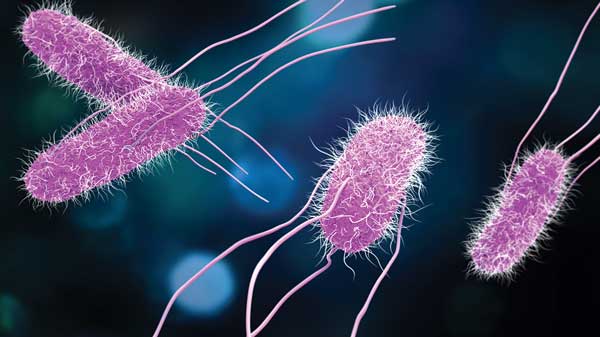New Tactics to Fight Foodborne Pathogens
IFTNEXT

With antibiotic resistance on the rise, scientists are trying to find solutions that control bacterial infections without making the problem worse. One source may lie with so-called “living antibiotics,” bacteria that feed on other disease-causing bacteria to acquire the necessary nutrients for growth and replication.
Bdellovibrio bacteriovorus is a type of predatory bacteria that is harmless to humans but effectively kills Gram negative bacteria such as E. coli. Researchers at the Okinawa Institute of Science and Technology Graduate University developed a way to manipulate the genes that influence B. bacteriovorus’ predatory behavior, particularly the timing and extent of it. Their study was published in the journal ACS Synthetic Biology.
Controlling this behavior may someday lead to the development of treatments for many different types of infections. “Manipulating gene expression is necessary for many applications but it is not currently easy to do in B. bacteriovorus,” says Yohei Yokobayashi, associate professor in the Nucleic Acid Chemistry and Engineering Unit at Okinawa Institute of Science and Technology and one of the authors of the study. “Our work is just a first step toward developing general tools to do genetic engineering in B. bacteriovorus. Controlling the predatory behavior is just one application which may help us to better understand their basic biology.”
For the study, the researchers inserted a riboswitch—a gene expression-controlling tool—into one of the genes that plays a role in B. bacteriovorus’ predatory behavior. They then treated it with the chemical theophylline. When the modified B. bacteriovorus was placed in a petri dish with E. coli, it multiplied more quickly than unmodified bacteria. From this the researchers developed a way that makes it easier to manipulate gene expression in B. bacteriovorus.
Research such as this in the early stages, and Yokobayashi says that his team is not yet actively pursuing practical applications, but that “it may be possible to engineer B. bacteriovorus so that predation occurs only within a defined condition (e.g., in a food processing factory) so that the engineered bacteria cannot replicate in the field.”
Inhibiting Salmonella
Researchers at the Stanford School of Medicine are looking into a possible way to control infections of Salmonella, the most common pathogen involved in food poisoning, without the use of antibiotics.
Research on mice led to the discovery that propionate, a short-chain fatty acid, works to inhibit Salmonella in the animals’ intestinal tracts. It does this by increasing the Salmonella organisms’ internal acidity, inhibiting their ability to multiply.
The researchers worked on strains of mice with markedly different rates of Salmonella propagation after infection. They killed off the digestive intestinal microflora of the mice with the faster propagation rate, then transplanted them with feces from mice that were more resistant to the infection. They were able to determine which of the microbes introduced by the transplant correlated with increased Salmonella resistance. Drilling further down, they were able to isolate several short-chain fatty acids produced by those microbes; testing them led to the discovery that propionate had the most direct inhibiting effect.
Finding a way to control Salmonella infections without antibiotics would eliminate the risk of harming the beneficial microflora necessary for digestion. More broadly, it would help cut back on the widespread use of antibiotics, which many microbiologists fear is adding to the development of antibiotic-resistant pathogens.
Denise Monack, the senior author of a paper describing the research published in Cell Host & Microbe, says that one of the next steps will be discovering other molecules, perhaps made by other gut bacteria, that can inhibit Salmonella growth.
“In addition, we are going to figure out exactly how propionate inhibits Salmonella growth, as this may lead to the discovery of additional molecules that could help protect us from this, and possibly other, ‘bad’ bacteria,” Monack says. “We are also currently looking at the impact of different diets on disease outcome in the context of Salmonella infections as well as in sepsis. In the future, we hope to identify components of the diet that inhibit the growth of gut pathogens and/or help keep the host healthy even in the context of an infection.”
IFTNEXT is made possible through the generous support of Ingredion, IFT’s Platinum Sponsor.
